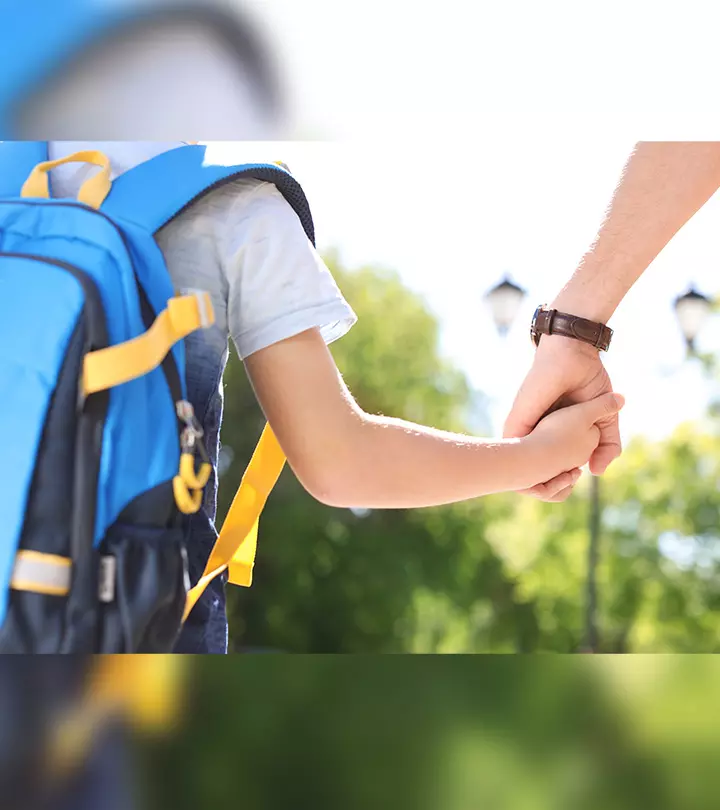
Image: Shutterstock
Being a parent is a beautiful feeling. It takes hard work, patience, and, most importantly, unconditional love to raise a child. In marriage, parental responsibility is shared between both partners. These responsibilities include providing a safe environment for the child, catering to their basic needs, and guiding them on the right path. However, when a couple goes through a divorce, they have to demarcate their responsibilities towards the child legally. In such cases, the court grants certain legal rights, authority, and responsibilities over a child and their properties to the parents. Thus, knowing your responsibilities is essential to ensure a balanced upbringing for your child. Keep reading this post as we discuss parental responsibility, how it is shared between a couple, what happens in the case of a divorce, and how and when the responsibility ends.

Key Pointers
- Parental responsibilities include various important rights and duties towards your child.
- You must be aware of the legalities and duration of the various responsibilities that are conceived to safeguard your child’s future.
- Continue reading to learn more about the legal principles and rules governing parental obligations and how they are handled in the event of a divorce.
What Is Parental Responsibility?

Parental responsibility is a set of rights and duties that a parent or a legal guardian has towards their children. Usually, parental responsibility includes both ‘parenting time’ and ‘decision making’.
When in a relationship, both partners have equal parental accountability towards their children, but when they get divorced, some responsibilities are shared or exclusively retained by one parent.
What Are Parental Rights?
As long as the child is a minor, the parents or legal custodians have the following rights in the US. However, these rights and responsibilities may vary from state to state.
- Child custody: It can be divided into two aspects, legal and physical:
- Legal custody decides the right to make decisions regarding the health, education, and welfare of the child.
- Physical custody decides where the child will live.
In the case of divorce or legal separation, the custody can be mutually decided or is decided by the court taking into consideration the best interests of the child. In some cases, the court can also assign custody to grandparents or others when both the parents are not fit for it.
 Do remember
Do remember- Visitation: Both the parents have a right to maintain contact with the child, meet them, and bond with them.
- Inheritance: The right to pass on the property to the child as an inheritance or as a gift. The rights also include access to the child’s earnings and inheritance in the case of the child’s untimely death.
Along with the rights, the law requires the parents to meet their responsibilities towards the child.
What Are Parental Responsibilities?
Here are the specific responsibilities that the parents or legal guardians must fulfill.
- Provide an environment that is safe and free of any physical, sexual and emotional abuse.
- Provide your child with basic needs such as nutritious food, shelter, clothing, and medical care.
- Nurturing the child’s self-esteem needs, such as accepting them for who they are, and offering encouragement and supporting them to grow in life.
- Teaching of moral values such as honesty, discipline, responsibility, patience, etc., and giving proper advice when they go wrong.
- Respect their feelings, opinions, and individuality.
- Take an interest in their education and spend quality time to help them meet their goals in life.
An anonymous father and blogger reflects on the days that have gone by and how foolish he had been when it came to his parental responsibilities. He shares, “When our kids were little, almost 40 years ago, my wife and I were as careless about seatbelts and how our lifestyle affected our kids… In the car, I still neglect the seat belt more often than not… I’m not bragging or even a little bit proud of these things, I’m just setting the stage.”
He continues, “In a demonstration of what a foolish man I really am, it has taken me most of my life to realize that my kids have taken cues from my attitude. I’m lucky, probably because I’ve provided such a fine example of the results of risk-taking, that my kids are alive and far more cautious than me… It took most of 60 years for me to get a wake up call. Like most humans, I’m most affected by my own faults when I see them in someone else (i).”
A parent’s responsibilities cannot be limited. The mother and the father are responsible for every aspect of the child’s life until the child reaches a certain age.
Who Has Parental Responsibility?

Parents must show awareness to the rules and regulations regarding the responsibility and custodianship of their child. US law has two rules to determine parental responsibility:
- The biological parents are the first to have parental responsibility. All birth mothers automatically get the responsibility (1), whereas the father only gets it if he is married to the mother at the time of the child’s birth.
- The law recognizes only one set of parents for parental responsibility. For example, after adoption, the biological parents lose all their rights on the child.
A few exceptions are:
- If the child was born before the couple got into the relationship, the mother will have the parental rights while the father has to apply to the court for joint parental responsibility.
- If the mother is a minor at the time of childbirth, a guardian is appointed for the child, and once the mother becomes a major, she can get parental responsibility.
- An unmarried man can accept parental responsibility for kids by marrying the mother and being named as the father on the certificate.
- When the parents are unfit or dead, the parental responsibility is given to the grandparents (if they volunteer) or to a certified agency.
A parent’s responsibilities are the highest when the child is an infant.
Gradually, the child grows to a stage where they no more need support and they become independent. Legally, this happens at a certain age.
When Does Parental Responsibility End?

Parental responsibility ends when the child attains the age of 18, but this can vary from state to state. The responsibilities might extend beyond 18 years if the child has any physical or mental disabilities.
In some cases, parental guidance ends even before the child is 18 years old. Such instances include:
- The child has married or entered a registered partnership before attaining 18 years.
- There are disputes in the marriage.
- The child is subjected to neglect or abuse.
- The father, who has obtained parental liability through a petition, will lose it if a specific order discharges it.
- The child is given up for adoption, in which case the responsibility gets transferred to the adopting parents.
While the responsibility ends in the above cases, in some cases the parents or guardians can lose or let go of it.
When Can A Parent Lose Parental Responsibility?

There are instances where a parent can lose custody and tutelage of their children either voluntarily or involuntarily.
- Voluntary termination: The parent decides to give up the commitment of the child. This is likely to happen when parents decide to get their child adopted or when the child is born to a minor mother. This voluntary termination can be done by surrendering their parental responsibility to a registered adoption agency or by choosing the adoptive parents (2).
 Did you know?
Did you know?- Involuntary termination: When there is a threat to the child’s welfare and life, the court can terminate parental responsibility. This is known as involuntary termination. The grounds for involuntary termination may vary from state to state. However, here are some of the common grounds for involuntary termination of parental responsibility:
- Chronic abuse or neglect
- Abandonment of the child
- Long-term mental illness of the parent or the parent is determined unfit of taking care of the child
- Long-term alcohol or drug abuse by the parents
- Inability to provide the basic needs and financial support to children
- Felony or imprisonment of the parent
Once it is determined that the parent is unfit to take up parental responsibility, the child is rescued by the child welfare system. In such cases, the parents do not lose their responsibility immediately. The child welfare system takes necessary steps to preserve the family and reunite them through services such as counseling, substance abuse treatment or family therapy.
While the parents undergo these services, the child is kept either with a foster family or a foster home. Once the court is convinced the family is safe for the child, it might reunite them. If not, the court will legally terminate their parental responsibility. In certain extreme cases, the court also has the authority to terminate the responsibility immediately.
What Happens To Parental Responsibility In The Case Of A Divorce?

In the case of a divorce, parental responsibility of minor children can be mutually decided by the couple. Otherwise, the court takes the decision while considering the best interests of the child.
There are four types of child custody in cases of divorce:
- Sole physical custody: In this type, the child shall reside with one parent but the legal custody rests with both the parents. Therefore, they must prepare a parenting plan and get it approved by the court. The other parent is then given visitation rights.
- Joint physical custody: Here the child spends time under the supervision of both the parents. This custody works well when the parents share mutual respect and friendship for each other.
- Sole legal custody: Only one parent has the authority to take all the important decisions regarding the child. Usually, physical custody also rests with the same parent. If the other parent is abusive, then the court can restrict them from having any contact with the child.
- Joint legal custody: Both parents have a say in the decision making regarding the child. Parents can share legal custody even if they do not share physical custody.
Matters regarding child support can also be decided mutually, or the court shall decide after taking into consideration the financial situation of both the parents. If done mutually, parents should create a flexible parenting plan that covers custody, visitation, and decision-making. This plan should take into account the child’s changing needs to ensure a supportive environment.
Frequently Asked Questions
1. How long does it take to get a court order for parental responsibility?
Since the parental responsibility and child custody laws in the US differ for each state, the timeframe to receive a court order depends on the laws in your state of residence.
2. Can parental responsibility be transferred?
Yes, when your child is given to new parents for adoption, the parental responsibility of the biological parents ends and is transferred to the adopted parents.
3. How do I prove that I have parental responsibility?
You can prove parental responsibility through various means, including providing documentation such as a birth certificate or written consent or agreement signed by the child’s other parent or legal guardian (4).
4. What is the difference between parental rights and parental responsibility?
Parental rights involve the legal privileges given to parents, such as decision-making authority for their child’s upbringing. Parental responsibility encompasses parents’ responsibilities and duties toward their child’s welfare and overall well-being (5).
5. How can a parent ensure they are fulfilling their parental responsibilities?
To effectively fulfill parental responsibilities, parents should prioritize their child’s welfare by creating a secure and nurturing atmosphere, actively engaging in communication and attentive listening, participating in their education and extracurricular activities, establishing appropriate boundaries, serving as a positive role model, and adapting suitable parental strategies according to the child’s age.
Parenthood is a beautiful journey that’s not easy, but it’s worthwhile. When you become a parent, a sense of responsibility, and mentorship instinctively develops. You do everything necessary to take care of your child and their happiness. However, when parents are unable to meet their child’s basic physical, emotional, or social needs or are divorcing, the law steps in. These laws help in the protection and security of the child’s interests in the case of any disturbance in parent-child relationships. They also assist parents in rethinking and reworking their relationship in order to maintain a happy and healthy parent-child relationship.
Infographic: How To Effectively Fulfill Parental Responsibilities?
Being a responsible parent may not be easy, but it’s definitely rewarding. To help you with it, we bring practical tips you can follow to ensure you are effectively fulfilling all your parental responsibilities. Read through and share with fellow parents to help sail smoothly through parenting.
Some thing wrong with infographic shortcode. please verify shortcode syntax
Illustration: What Are Parental Responsibilities & Rights When Do They End?

Image: Dall·E/MomJunction Design Team
Discover the essence of parental responsibility in this animated video, exploring the vital obligations and duties involved in nurturing a child.
Personal Experience: Source
MomJunction articles include first-hand experiences to provide you with better insights through real-life narratives. Here are the sources of personal accounts referenced in this article.
i. #117 Parental Responsibility;https://geezerwithagrudge.blogspot.com/2015/07/117-parental-responsibility.html
References
1. Denise A. Skinner, Julie K. Kohler; Parental rights in diverse family contexts: Current legal developments; Vol.51, No.4, Families and the law (2002)
2. Consent to adoption; Child Welfare Information Gateway; Children’s Bureau.
3. Overview of Terminating Parental Rights; Family Law Self-Help Center
4. National Legal Service: What is proof of parental responsibility?; NLS5. Your duties and rights as a parent; NSW
Community Experiences
Join the conversation and become a part of our nurturing community! Share your stories, experiences, and insights to connect with fellow parents.
Read full bio of Rabbi Shlomo Slatkin
Read full bio of sanjana lagudu
Read full bio of Shikha Thakur
Read full bio of Apoorva K


















